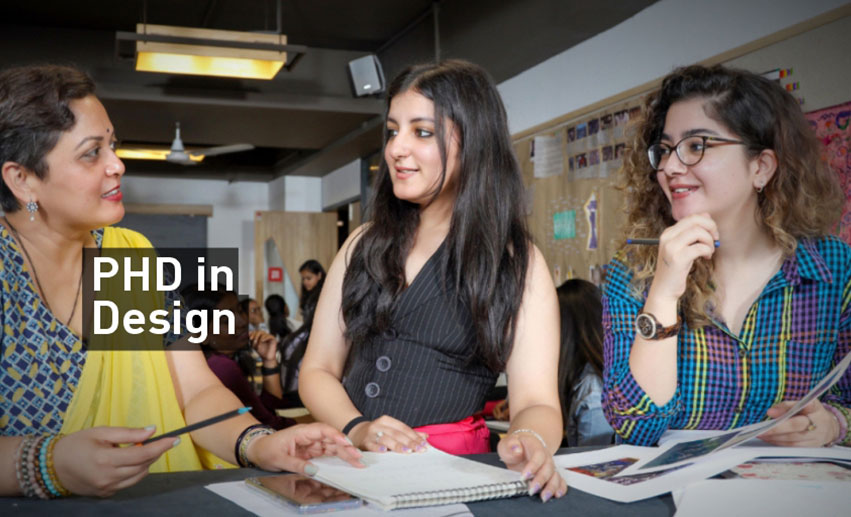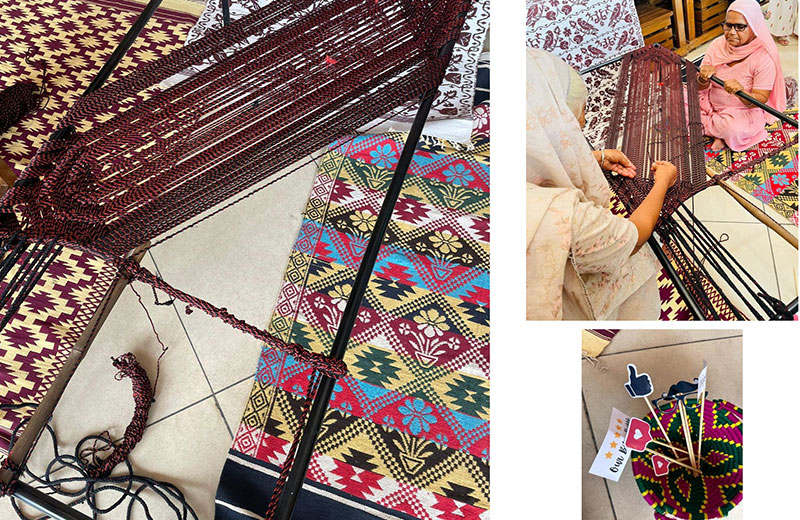

The Doctoral Program in Design with a specialization areas in Fashion Studies, Textiles and Multidisciplinary Design Space at Chitkara University helps the scholars to extensively explore the concepts and research skills, as well as delve into analyzing the knowledge related to their respective areas of research objectively. The scholars will follow a program of self-directed, independent study, supported by experienced supervisors who are themselves experts in their area. They are also supported by the wider research community in Fashion and Design and will have regular opportunities to attend research seminars, conferences and symposia.
The academic program is interdisciplinary in nature and carried in a comparative perspective to fulfill the contemporary requirements. Notably, the program facilitates scientific guidance for the research students with adequate infrastructure and support to fulfill their requirements.

Chitkara University’s doctoral program enables fashion, textiles & Design professionals and academicians to extend their professional careers by infusing theoretical/conceptual/practical knowledge to develop research skills. Furthermore, the program empowers the visual Arts & Design practitioners, art entrepreneurs, academicians, and cultural workers to analyse contemporary situations, and implement the best workable solutions to complex contemporary art issues.
Post the completion of the doctoral program, the students can expect to –
The candidates who have completed any of the following qualification(s) are eligible to seek admission to the PhD program as per Chitkara University regulations and UGC Minimum Standards and Procedure for Award of PhD Degree Regulations, 2022 issued dated 07.11.2022 [(New Delhi, 7th November, 2022; No. F. 1-3/2021(QIP)].
A 4-year/8-semester bachelor’s degree program in Fashion / Textiles/ Design discipline with a minimum of 75% marks in aggregate or its equivalent grade on a point scale wherever the grading system is followed, subject to the following conditions:
Note: Relaxation for reserved categories as per UGC norms
Candidates who fulfil the eligibility criteria, are required to fill the admission form with evidences of all particulars to be attached. All application forms will be screened by a separate screening committee whose representatives will be from Doctoral Research Committee and Experts from the University in the respective areas. The candidates short-listed on the basis of their academic record and relevant experience will appear in a written test to be conducted by the University. Time-table & Curriculum will be intimated to the registered candidates. The candidates will then appear for a personal interview for the final selection.

| Fee Components | Amount |
|---|---|
| Enrolment Fee | Rs. 30,000/- |
| Career Advancement Services Fee | Rs. 20,000/- |
| Course Work Fee 1 | Rs. 25,000/- |
| Course Work Fee 2 | Rs. 25,000/- |
| Course Work Fee 3 | Rs. 25,000/- |
| Doctoral Seminar on Specialisation | Rs. 60,000/- |
| Synopsis Seminar Fee | Rs. 60,000/- |
| Progress Review Seminar 1 | Rs. 20,000/- |
| Progress Review Seminar 2 | Rs. 20,000/- |
| Progress Review Seminar 3 | Rs. 20,000/- |
| Pre-Thesis Submission | Rs. 40,000/- |
| Thesis Submission & Defence Fee | Rs. 75,000/- |
| Total | Rs. 4,20,000/- |
The curriculum includes compulsory coursework, research proposal and objectives, research work and progress, pre-thesis work, and thesis defense. It also includes fulfillment of all research objectives, acceptance/publication of research papers in peer-reviewed journals or conferences.
The course work comprises of five components: research methodology, advanced research methodology, doctoral foundation seminar, doctoral concentration seminar, and research & publication ethics. After successfully completing coursework, the research scholar works in close coordination and under the strict supervision of his / her research guide, prepares the research proposal, and identifies the objectives of the research work.
Progress of the research work is reviewed every six months and finally, the scholars submit their thesis and defend it. The Doctoral Research Committee (DRC) closely mentors and monitors this process.

| Phase | Sub components | Outcome |
| Course Work | Research Methodology | Enabling scholars to purse research in a methodical manner |
| Advanced Research Methodology | Enabling scholars to know about tools and technologies to process their data | |
| Doctoral Foundation Seminar | Enabling and equipping scholars with required tools and technologies in their broad discipline area | |
| Doctoral Concentration Seminar | a) Motivation to Research, b) identification of base paper(s), c) State-of-art, d) Identification of research gaps, e) Identification of Tools/Technologies for conducting proposed research | |
| Research & Publication Ethics | Sensitisation towards research; Ethics and respect to science and research integrity; Intellectual honesty and research integrity; Scientific misconducts; Falsification, Fabrication and Plagiarism | |
| Submission of Research Proposal | Extensive literature review / research proposal submitted to Dean (DRC) in prescribed format | |
| Progress Seminar – I | Progress on identified research objectives | |
| Progress Seminar – II | Progress on identified research objectives | |
| Progress Seminar – III | Progress on identified research objectives | |
| Pre Thesis Seminar | Achievement of all objectives, Thesis ready in final shape, Research paper(s) communicated to Conferences / Journals | |
| Thesis Submission and Defence | Eligibility for award of PhD degree |
The PhD program at Chitkara University will prepare you for an outstanding career in research and teaching. Right from your first semester, you’ll get to work with faculty mentors across your field as you investigate the challenges that interest you. Our doctoral program students have the ability—and diligence—to study complex issues that the world right now faces.


Our PhD Program is strategically designed to cater to the needs of high-achieving professionals aiming to enhance their career in the world beyond academia as well. While conventional academic skills are often developed through courses and mentoring, we also incorporate various pedagogical approaches to mentor them as leaders, entrepreneurs, etc., equipping them with numerous transferable skills, thus grooming them for successful careers in the industry.


Our PhD students get the opportunity to present their work at prominent conferences. Such conferences, we believe, provide a platform to present one’s research to a global and important audience of scholars and experts in the field. Resultantly, our scholars are ahead at knowing about latest developments as well as open issues that the research community is collectively deliberating upon.


Our faculty closely works with research scholars on all phases of the research process—from idea generation and study design to data analysis and writing. The culture is collegial and informal, with students viewed as colleagues and co-authors. Moreover, students are encouraged to work with multiple faculty, which helps them widen their perspective on contemporary issues in their field.


In our PhD Program one finds the most conducive environment to work in collaboration with other scholars, teachers and ace researchers. Our ideology is simple - collaborative teams exhibit important research outcomes, far beyond what could be accomplished by individuals working independently.